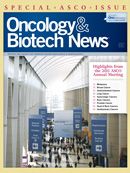Publication
Article
Oncology & Biotech News
In Metastatic Breast Cancer, Eribulin Safe and Effective in All Ages
Author(s):
An exploratory analysis of the phase III EMBRACE trial of eribulin mesylate in metastatic breast cancer found the survival benefit and toxicity profile to be independent of age.

Christopher Twelves, MD
An exploratory analysis of the phase III EMBRACE trial of eribulin mesylate in metastatic breast cancer found the survival benefit and toxicity profile to be independent of age, suggesting that the drug can safely and effectively be given to older women.
The results were presented at ASCO in June by Christopher Twelves, MD, of the University of Leeds and St. James University Hospital in London, England.
The EMBRACE study (Eisai Metastatic Breast Cancer Study Assessing Physician’s Choice versus Eribulin) was a global, randomized openlabel phase III trial involving 762 heavily pretreated metastatic breast cancer patients. Treatment with eribulin, a member of a new class of antineoplastics called halichondrins, improved overall survival (OS) by 2.5 months.
Median OS, the primary endpoint, was 10.65 months with standard single-agent therapy (physician’s choice) and 13.12 months with eribulin, representing a statistically significant 19% reduction in mortality risk (P = .04). Interestingly, progression-free survival (PFS) by independent review was improved numerically though not significantly, by 1.5 months.
In the analysis presented at ASCO, the effect of eribulin was examined across 4 age cohorts for the eribulin-treated cohort (n = 508). Analyses were further stratified by geographic region, HER2 status, and prior capecitabine use.
“Median overall survival trended inversely with age; however, this effect was nonsignificant when fitted as a categorical or continuous covariate,” Twelves reported.
A similar nonsignificant trend was observed for PFS, objective response rates, and clinical benefit rates.
The rate of grade 3/4 adverse events did not differ significantly across the age groups, including neutropenia, febrile neutropenia, and neuropathy, nor did treatment-withdrawal rates differ, Twelves added.
“This analysis, while in a limited number of older patients, suggests survival outcomes with eribulin are independent of age. Importantly, toxicity appears no greater in older patients,” Twelves concluded. “Age alone should not preclude the consideration of eribulin for older patients.”
Twelves C, Vahdat LT, Cortes J, et al. The relationship between age and survival outcomes for eribulin in metastatic breast cancer. J Clin Oncol. 2011;29(suppl; abstr 1060).










